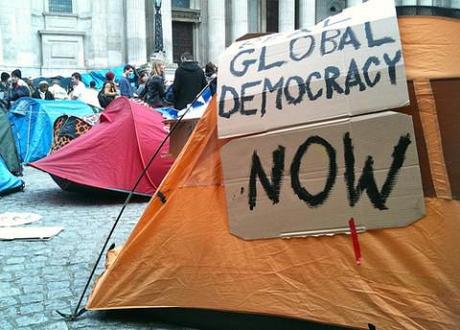
Occupy London. Photo credit: Neil Cummings, http://flic.kr/p/awim5Z
From humble beginnings, Occupy Wall Street has grown into a global movement. Despite heavy-handed police crack-downs from Oakland to UC Davis, new Occupy camps keep popping up as supporters are turned on by the left-leaning anti-establishment message. However, even within the movement, there are some who question the overall direction and aims, and wonder whether the self-styled uprising of the 99 percent can really effect real change. Will Occupy continue to grow or will it fizzle out?
A brutal crack-down on an Occupy protest at UC Davis, which saw peaceful protesters pepper sprayed by police, has enraged online supporters of the movement, who have raced to poke fun at the pepper spray cop via hundred of memes.
99 percent can make and take the power. Writing at The Guardian Comment is Free, European philosophy teacher and education activist Peter Hallwood insisted that “Occupy has the power to effect change… In action after action, Occupy has already sent shockwaves through established centres of power all over the world. If further actions continue and spread they may soon begin to elude the coercive mechanisms designed to hold them in check.” Hallwood argued that “it’s increasingly obvious” that “only direct action on a mass scale now offers any prospect of an alternative to local variations on market-imposed plutocracy.” Hallwood asserted that rallies, protests and the occupation of symbolic spaces “can change the balance of power” and called on the 99 percent to keep up the fight: “when civil disobedience and noncompliance acquires a depth and scale that no police operation can break – then the fundamental isolation of the tendential 1% will be exposed for all to see … For the 99%, the power is ours to make and to take.”
The protesters are stupid. So are the media. Writing at The Daily Mail’s Right Minds comment hub, Thomas Fleming lamented that the “pepper spray attack has led to a temporary resurgence in this political theater.” Fleming displayed little patience with the movement, which he referred to as “one of those irritating little problems that refuses to go away, something like the mosquito bite you have scratched until it got infected. In one sense, it is better to ignore the irritation than to scratch it.” Fleming regretted that the media has made such a big deal about the pepper spraying incident: “The demonstrators are, indeed, as stupid as the proverbial chicken, but not so stupid as the people in the media who defend them.”
Participatory democracy at work. The Economist’s Democracy in America blog argued that the Occupy movement is a return to participatory democracy and that the OWS protesters are “staking a claim for a particular vision of democracy that is opposed to the more sedentary, passive, poll-driven vision of representative interest-group democracy. It’s a vision in which democracy is not polls, campaigns, lobbying groups and PACs, but mike checks, general assemblies and direct action, in which people don’t just reactively register their preferences but go out into the public arena to engage each other, to develop and advocate and realize their visions for what society ought to do and be.” In taking to the streets and parks to voice their dissatisfaction with the present system, the protesters are “the descendants of a vital utopian strand in American political history”, insisted the magazine, which, however, severely doubted they will ever achieve the “utopian transformation” they crave. Regardless, the movement has value to the mainstream: “people who want to gather in spontaneous camps, hold come-one come-all general assemblies and try to radically re-envision the entire global social and economic system should keep on doing that too. They’re never going to see anything that we who think in terms of mainstream politics would understand as a ‘victory.’ But they are a wellspring to which conventional representative politics periodically turns for inspiration and momentum, when the conventional mechanisms run out of torque.”

